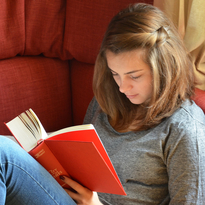Daisy

Daisy caught Covid in September 2021 at school and after a couple of weeks developed severe stomach cramps. Daisy’s stomach pain, which they noticed was made worse after eating, has been helped by a restrictive diet. They have had limited help from health professionals and Daisy has been off school for the last few months. Daisy was interviewed with her mum in March 2022.
Daisy is 14 and lives with her mum, dad and three dogs. Ethnicity: White British.
More about me...
Daisy caught Covid in September 2021. She was ill for a week with bad flu-like symptoms and a high temperature. A couple of weeks after, she started getting bad stomach pains but thought it might be ‘period stuff.’ In December, Daisy was sent home from school with excruciating stomach cramps, thinking it was period related, but after 6 hours they called an ambulance. The paramedics were considering endometriosis but thought she was too young, and she wasn’t taken to hospital. She took some TXA [Tranexamic acid is a medicine that controls bleeding], which they thought would help but it didn’t.
The pain went away eventually but started again in January when her next period started and ‘it was just continuous.’ They called an ambulance again due to Daisy’s level of pain and this time they took her to hospital. She was prescribed with the contraceptive pill, but this made it worse, and a gynaecologist later agreed the pill was not helping and she came off it, “I had no respite from this pain, three times a day I was in agony.” Over this period, she had been on Oramorph, naproxen, codeine, mefenamic acid, TXA and Amitriptyline but nothing seem to be helping and at the hospital “they were either telling me it was in my head or saying, ‘Oh, here’s some morphine, go home, there’s nothing we can do.’” She saw several paediatricians, but they too couldn’t work out the problem – all her blood tests came back normal. At this time, her Mum started to think it might be Long Covid related.
They decided to see if her pain was triggered by diet as it seemed to be worse after eating. Restricting her diet has helped but she has found she then suddenly reacts to food she previously could eat. Her dad organises all her food charts to see what she can eat. Each food she tries is trial and error and she has to wait an hour between each food to see if she reacts. Daisy is vegetarian, but she currently can’t eat gluten, dairy, oil, or sauces – “We haven't had any, sort of, formal help; we’ve never seen a dietician or anything.” They are on the waiting list to see a dietitian.
Daisy’s pain and restricted diet have meant she hasn’t gone to school in two months, but she tries to keep up with some work online. It has affected her friendships, and she misses her friends “because at school you talk to them every day but, like, now I’m at home, like, they all think I’m dead.”
Daisy finds her pain and food intolerances very stressful, but thinks her parents have been more impacted, mentally, financially, and with work. Her Mum says, “Our priority is Daisy, so actually we move heaven and earth to sort out this situation, so we forfeit other things.”
Both her mum and Daisy have praised the paramedics “every time we’ve had an ambulance guy round, it...they’ve always been so lovely,” but the lack of diagnosis and progress in helping her get better is frustrating to Daisy who has been told by health professionals “it could be Long Covid, but I’m not going to investigate it further and you just have to...when you're in pain, just take more morphine.” She thinks this lack of progress is mainly due to her not having any fatigue symptoms. Daisy has tried to get access to Long Covid clinics, but they are not in the catchment area of any clinics and are still waiting for a referral. Daisy says the lack of belief by health professionals “makes you feel paranoid within yourself, it makes you feel like ‘Oh, I’m... I’m just wasting their time because it’s something I’m doing wrong, it...it’s in my head, there’s nothing even wrong with me,’ and I just think for me to be in that amount of pain, no, this can’t just be in my head, it...there must be something going wrong.” Daisy’s mum finds it unhelpful that they have been “passed around from pillar to post. Never seeing the same person again,” and that the lack of communication between services is infuriating. She has tried to do her own research and contact specialists for help, and some have been helpful.


